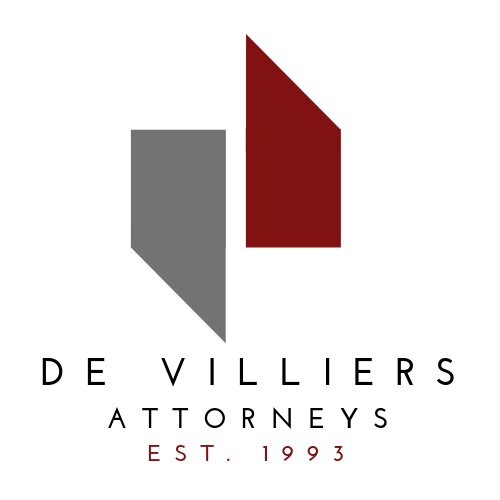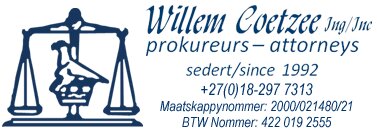Best Nonprofit & Charitable Organizations Lawyers in Potchefstroom
Share your needs with us, get contacted by law firms.
Free. Takes 2 min.
List of the best lawyers in Potchefstroom, South Africa
About Nonprofit & Charitable Organizations Law in Potchefstroom, South Africa
Nonprofit and charitable organizations in Potchefstroom, South Africa, play a crucial role in addressing social, environmental, and economic issues. These organizations are designed to operate without profit motives, dedicating any surplus generated to advance their causes. The legal landscape for nonprofits and charities in South Africa includes a range of regulations that govern their formation, management, and dissolution. Compliance with specific legal frameworks ensures accountability, transparency, and the effective delivery of services to communities in Potchefstroom and beyond.
Why You May Need a Lawyer
Engaging a lawyer experienced in nonprofit and charitable organization law is invaluable under a variety of circumstances. You may need legal assistance when setting up a nonprofit to ensure proper registration and compliance with national and local regulations. Lawyers can also assist in drafting constitutions, bylaws, and governing documents. Furthermore, they provide guidance in tax exemption applications, managing donor agreements, and navigating employment laws for hired staff. During disputes or investigations by authorities, legal counsel becomes essential to protect your organization's interests and ensure adherence to legal obligations.
Local Laws Overview
The regulatory framework for nonprofits and charitable organizations in Potchefstroom is primarily governed by the Nonprofit Organisations Act No. 71 of 1997. This legislation ensures that organizations operate transparently and responsibly. It mandates registration with the Department of Social Development and adherence to specific reporting requirements. Charitable entities might also qualify for tax exemptions under the Income Tax Act. Compliance with the Companies Act may be necessary for those structured as nonprofit companies. Additionally, local municipal bylaws may impact operational aspects, such as event hosting and public fundraising activities.
Frequently Asked Questions
What is the difference between a nonprofit and a charity?
While both aim to help the community, a charity primarily engages in philanthropy and fundraising for specific causes, whereas a nonprofit operates broader activities without generating a profit, reinvesting any surplus to achieve its objectives.
How do I start a nonprofit in Potchefstroom?
To start a nonprofit, you must draft a founding document, register with the Department of Social Development, and ensure compliance with national and local laws. Legal advice is recommended to ensure proper setup.
Do I need to register my charity with the government?
Yes, to legally operate, all nonprofits and charities should be registered with the Department of Social Development, allowing them to receive public funds and provide transparency in operations.
What tax benefits are available for nonprofits?
Registered nonprofits may qualify for income tax exemption and receive donations deductible for donors under Section 18A of the Income Tax Act, provided they meet certain criteria.
Can a nonprofit engage in commercial activities?
Yes, nonprofits can engage in commercial activities, but all profits must be reinvested into the organization's mission. Legal guidance can ensure compliance with relevant laws.
What happens if a nonprofit fails to comply with legal requirements?
Noncompliance can lead to penalties, loss of registration status, and in severe cases, legal action against the organization and its leaders. Regular legal audits are advisable.
What is the role of the Board of Directors in a nonprofit?
The Board of Directors oversees the organization's operations, ensures compliance with laws, and guides strategic direction. They are legally responsible for the nonprofit's actions.
How can a nonprofit protect its intellectual property?
A nonprofit can protect intellectual property by registering trademarks, copyrights, and patents as applicable, ensuring legal ownership and protection against unauthorized use.
Can a foreigner start a nonprofit in South Africa?
Yes, foreigners can establish nonprofits in South Africa, but they must comply with local laws and ensure proper registration and regulation adherence.
Are there employment laws that nonprofits need to follow?
Yes, employment laws in South Africa apply to nonprofits, including labor relations, conditions of employment, and equal opportunity requirements. Legal advice is crucial for compliant HR practices.
Additional Resources
Several organizations and government bodies provide resources for nonprofits, including the Department of Social Development, South African Revenue Service for tax-related inquiries, and legal advisory services specializing in nonprofit law. The South African National NGO Coalition (SANGOCO) and CharitySA also offer support and information to nonprofits and charities operating locally.
Next Steps
If you require legal assistance with nonprofit and charitable organization matters, it is recommended to consult a lawyer specializing in this field. Start by searching for local legal professionals with experience in nonprofit law, or contact local legal advisory services for recommendations. Ensure you clearly understand your organizational needs and bring all relevant documentation to your consultation to facilitate a comprehensive review and advice.
Lawzana helps you find the best lawyers and law firms in Potchefstroom through a curated and pre-screened list of qualified legal professionals. Our platform offers rankings and detailed profiles of attorneys and law firms, allowing you to compare based on practice areas, including Nonprofit & Charitable Organizations, experience, and client feedback.
Each profile includes a description of the firm's areas of practice, client reviews, team members and partners, year of establishment, spoken languages, office locations, contact information, social media presence, and any published articles or resources. Most firms on our platform speak English and are experienced in both local and international legal matters.
Get a quote from top-rated law firms in Potchefstroom, South Africa — quickly, securely, and without unnecessary hassle.
Disclaimer:
The information provided on this page is for general informational purposes only and does not constitute legal advice. While we strive to ensure the accuracy and relevance of the content, legal information may change over time, and interpretations of the law can vary. You should always consult with a qualified legal professional for advice specific to your situation.
We disclaim all liability for actions taken or not taken based on the content of this page. If you believe any information is incorrect or outdated, please contact us, and we will review and update it where appropriate.









